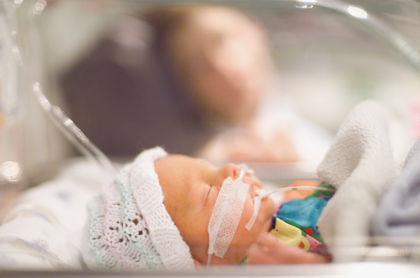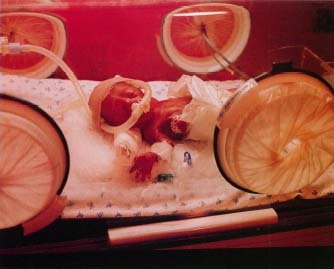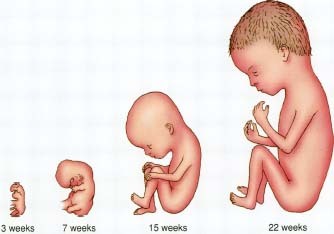Prematurity

Premature (orpreterm) babies are those born before the thirty-seventh week of pregnancy. Pregnancy is calculated from the first day of the mother's last menstrual period * before conception (kon-SEP-shun). Full-term babies are born in the thirty-eighth to forty-second week of pregnancy.
KEYWORDS
for searching the Internet and other reference sources
Childbirth
Neonatol Intensive core
Obstetrics
What Causes Premature Birth?
In the third trimester * of pregnancy (months 7, 8, and 9), the fetus * adds ounces of body weight and is better prepared for living outside the mother's body. Many premature babies are not ready to live on their own.
There are a variety of reasons for a mother to go into labor early. Histories of women giving premature birth show several risk factors: poverty, poor prenatal * care, poor nutrition, smoking, alcohol abuse, and drug abuse.
Physical abnormalities, such as a misshapen uterus * , may cause early labor. The cervix * , the opening to the uterus, may loosen and open too soon. If the mother has an illness (such as high blood pressure) or the baby is at risk, the doctor may induce labor. Inducing labor means the mother is given a drug to start contractions.
A Look at the Preterm Baby
Preterm infants tend to look very frail, with thin pink skin with underlying veins showing through and very little body fat. Yet they are active. Even those born 12 weeks early can open their eyes and respond to sound, light, and being touched. Their skinny arms and legs are wrin-kled and covered with fine hair, called lanugo (la-NOO-go).
Small babies must be kept warm. The surface area of any baby's skin is large relative to the mass of the body. Premature babies lose heat more quickly and need a climate-controlled incubator (IN-ku-ba-tor).
Breathing
Some premature babies are not ready to breathe on their own. Apnea * , when breathing stops for several seconds, is common. A special apnea mattress assists breathing, and the heartbeat is monitored. If these episodes begin to last a long time, a ventilator (VEN-ti-lay-tor) or breathing machine is used.
* menstrual period (MEN-stroo-al PE-re-od) is the discharging through the vagina (vaJY-na) of blood, secretions, and tissue debris from the uterus (YOO-ter-us) that recurs at approximately monthly Intervals in females of breeding age.
* trimester (trl-MES-ter) Is any of three periods of approximately 3 months each into which a human pregnancy Is divded.
* fetus (FEE-tus) in humans, Is the unborn offspring in the period after It Is an embryo, from 9 weeks after ferHilization until birth.
* prenatal (pre-NAY-tul) means existing or occurring before birth, with reference to the fetus.
* uterus In humans is the organ in females for contalning and nourlshing the young during development in the period before birth. Also called the womb.
* cervix (SER-viks) Is the lower, narrow end of the uterus.
* apnea (AP-nee-a) Is when breathing stops for several seconds.
* oxygen (OK-si-len) is an odorless, coloress gas essential for the human body. It Is taken In through the lungs and delivered to the body by the bloodstream.
* carbon dioxide (CAR-bon dy-OK-side) is an odorless, colorless gas that Is formed In the tissues and breathed out through the lungs.
Premature babies may experience respiratory distress syndrome (RDS). This is because the babies' lungs do not have the slippery lubricant called surfactant (sir-FAK-tant) that allows the lungs' tiny air sacs, called alveoli (al-VEE-o-ly), to open and close smoothly. Without sur-factant, babies have to struggle to transfer oxygen * and carbon dioxide * . Infants may become exhausted and may not get enough oxygen. This lack of oxygen causes major changes in the body's chemistry. Artificial surfactant and breathing assistance may be needed temporarily, until babies begin to make natural surfactant on their own.


Feeding
Feeding may be a problem for premature infants. Sometimes, they cannot suck adequately, and they are fed through a fine tube placed in the nose or mouth that goes into the stomach. Newborns, who even cannot tolerate tube feeding because their digestive system is too immature to handle any food, may receive nutrients through their veins.
Jaundice
Preterm babies may have a yellow pigment called bilirubin (BIL-e-roobin) accumulate in the blood and skin, causing jaundice UAWN-dis). The liver * is not mature enough to break down bilirubin, and high levels may causes brain damage. Treatment involves phototherapy (fo-to-THER-a-pee), exposure to fluorescent lights, which reduces the bilirubin levels.
Very Low Birth Weight Babies
A very low birth weight infant weighs less than about 3 pounds and is more than 8 weeks early. Babies this small frequently need special care, but any newborn baby who is ill or has obvious problems may be looked after in special care units called neonatal * intensive care units or NICUs.
Low birth weight is often times caused by lifestyle choices of the mother, who ignores prenatal care or does not see a physician. Smoking, alcohol, and drugs may also contribute to low weight.
* liver is a large organ located in the upper abdomen (AB-do-men) that has many functions, including storage and filtration of blood, secretion of bile, and participation in various metabolic (met-a-BOLL-ik) processes.
* neonatal (ne-o-NAY-tal) means pertaining to the first 4 weeks after birth.
Today, we are better able to help very tiny, very sick newborns survive than ever before. Specialized NICUs are available throughout the country. The cost to take care of these very sick babies is huge, and the number of premature births is increasing. About 1 out of every 10 births in the United States is premature. Many babies are surviving, but some will have lifelong problems of learning or physical development.
Resource
Luke, Barbara. Every Pregnant Woman's Guide to Preventing Premature Birth: Reducing the 60 Proven Risks That Can Lead to Prematurity. Middlebury, IN: Diane Publishing Company, 1998.
I did every thing correctly during my pregnancy. I took pregnancy vitamins in the lead up to getting preganat, continued them through out my pregnancy, ate the correct things, never smoked or drank any alcohol, took time out to rest while I was at work...My waters broke when i was 24 weeks pregnant and my baby arrived 3 weeks later. I met many other mothers in the same situation as me. Early babies and low birth weight is not often caused by mothers lifestyles, please research this further and amend what you have written as it is incorrect and VERY offensive.
Just like 'caring mother' I am totally fed up with people suggesting that my lifestyle could be the cause of my premature labour. It's hard enough that you have to leave your kid in hospital. I was often confronted with people who had clearly no idea how hard this is to young parents, especially a mother.